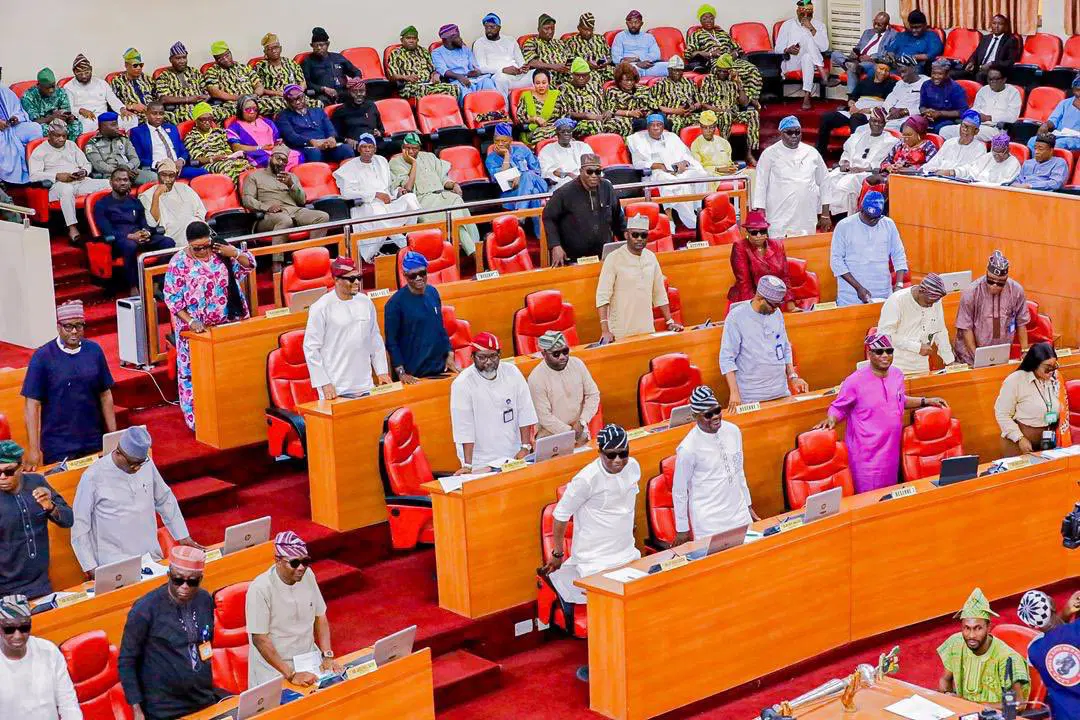The Lagos State House of Assembly has thrust its staff and legislative aides into an indefinite remote work arrangement, a drastic move to avert potential violence amid a festering leadership crisis. Announced on Sunday via an internal memo titled “Amendment to Remote Work Schedule Arrangement” by Acting Clerk Babatunde Ottun, the directive reflects mounting fears over security within the Assembly complex. What began as a power struggle among lawmakers has spiraled into a saga of oustings, lockdowns, and legal battles, leaving Nigeria’s economic heartbeat with a fractured legislative pulse.
The crisis ignited in January when lawmakers toppled Speaker Mudashiru Obasa and former Clerk Olalekan Onafeko, installing Obasa’s erstwhile deputy, Mojisola Meranda, as the new Speaker. Tensions simmered until February 17, when operatives from the Department of State Services (DSS) sealed the Assembly complex, thwarting a planned plenary session. Undeterred, lawmakers breached the blockade, convened briefly, and adjourned indefinitely, doubling down on their allegiance to Meranda. The standoff wasn’t without cost—three staff members now face trial for allegedly assaulting DSS operatives, a stark escalation in the conflict.
Obasa, however, refuses to fade quietly. On February 27, he stormed the complex with heavy security, reportedly forcing entry into the Speaker’s office. Flanked by supporters clamoring for his reinstatement, he resumed duties, dismissing his removal as unconstitutional. His defiance has since taken legal form—a lawsuit filed against Meranda, the Assembly, and 36 lawmakers, set for a hearing at Ikeja Court on Friday. The News Agency of Nigeria reports that this clash has cleaved the Assembly into rival factions, each claiming legitimacy, with the complex itself a contested battleground.
The leadership crisis has bred more than just political drama; it’s sparked genuine security concerns. Ottun’s memo frames the remote work order as a safeguard, stating, “This measure is necessary pending the resolution of the leadership dispute.” Legislative activities will persist virtually, though no timeline for normalcy exists—a limbo that tests the Assembly’s resilience. Staff, including those under the Lagos State House of Assembly Service Commission (LAHASCOM) and legislative aides, must now adapt to an uncertain future, their physical workplace a potential flashpoint.
The stakes are high in Lagos, where the Assembly wields outsized influence over Nigeria’s commercial capital. The ouster of Obasa—a veteran powerbroker—upended a long-standing order, but Meranda’s ascent has yet to stabilize the institution. The DSS intervention hints
The stakes are high in Lagos, where the Assembly wields outsized influence over Nigeria’s commercial capital. The ouster of Obasa—a veteran powerbroker—upended a long-standing order, but Meranda’s ascent has yet to stabilize the institution. The DSS intervention hints at broader state interest, while Obasa’s forceful return suggests he retains significant backing. Amid this tug-of-war, Lagos State Head of Service Bode Agoro has endorsed the leadership shift, urging staff to rally behind Meranda and Ottun. Yet, with lawsuits pending and loyalties divided, unity remains elusive.
For staff, the shift to remote work is both a reprieve and a burden. Ottun has assured them of Meranda’s commitment to their safety and a peaceful resolution, but the absence of a clear endpoint breeds unease. Legislative aides, accustomed to the bustle of Alausa, now navigate virtual duties, while the complex—once a hub of debate—sits eerily quiet, save for the echoes of February’s clashes. The three staffers facing trial are a sobering reminder of the crisis’s human toll, caught in a power struggle not of their making.
This isn’t just a Lagos story—it’s a Nigerian one. Leadership disputes in state assemblies often mirror national fault lines: factionalism, impunity, and the specter of violence. The DSS lockdown, Obasa’s armed return, and the remote work edict evoke a governance system under strain, where institutions bend but rarely break. Yet, the cost is undeniable—disrupted lawmaking, eroded public trust, and a workforce sidelined by elite infighting.
As the Ikeja Court prepares to weigh Obasa’s challenge, the Assembly teeters on a precipice. Will Meranda consolidate power, or will Obasa reclaim his perch? For now, remote work is the stopgap, a pragmatic shield against chaos. But it’s no solution. Lagos deserves a functioning legislature, not a virtual shadow. Until the crisis resolves, staff and citizens alike watch from afar, hoping order emerges from a storm that’s already lasted too long.












I wonder if remote work will actually solve the Lagos Assemblys leadership crisis or just add to the confusion. What do you all think?
I think this crisis could lead to positive change. Maybe remote work will improve transparency and accountability in the Lagos Assembly.
I wonder if remote work could actually improve productivity in the Lagos Assembly. Maybe they will surprise us!
I think the Lagos Assembly needs to embrace remote work fully for efficiency. Why waste time on unnecessary drama? Lets get productive!
I wonder if remote work will actually solve the leadership crisis in Lagos Assembly or just add more chaos? Thoughts?
Is remote work really the solution to Lagos Assemblys leadership crisis? Lets discuss the pros and cons! 🤔🏢 #workfromhome #leadershipdrama